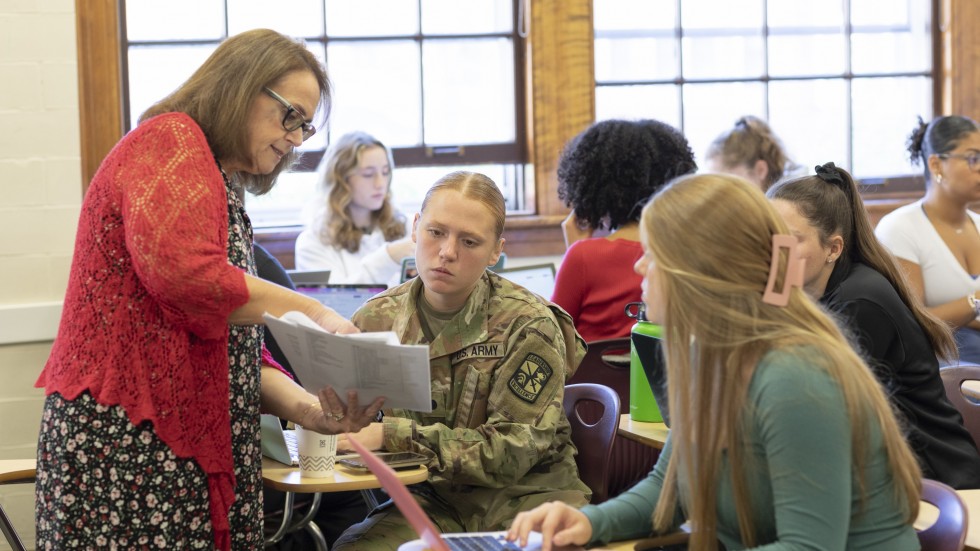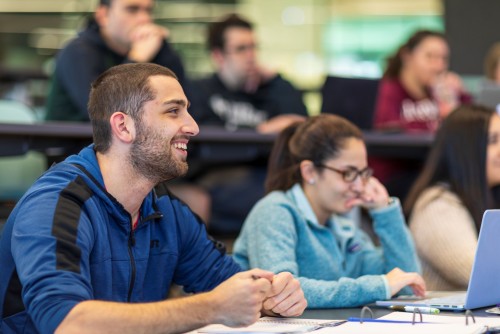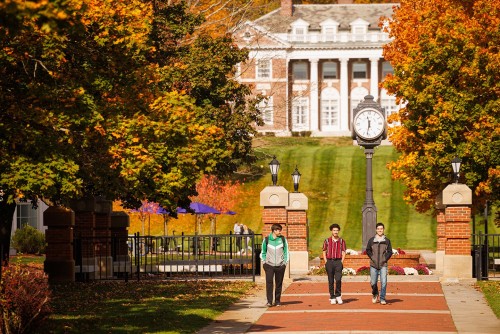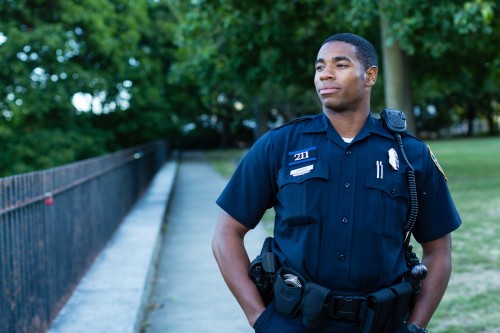Criminology Major & Minor
The Department of Criminology at Stonehill, which is ranked No.4 on College Factual’s 2022 list of the best U.S. colleges for a major in criminology, provides knowledge in the theory and practice of the social sciences, research methodology and law.

Pictured Above: Criminology Professor Pamela Kelley confers with Hannah Guidi ’23, a criminology major and ROTC member.
Criminology Department Overview
The Criminology major and minor at Stonehill provides students with a foundation to understand the political, economic and cultural patterns that shape definitions of crime, the practices of law, the criminal justice system, the causes and consequences of crime, and crime control policies.
Criminology students take a critical look at the organization and operation of crime control systems at a local, state, federal and international level, including the development and practice of criminal justice, social justice and restorative justice. In addition, other courses examine the nature of individuals and groups that are in conflict with the law or cause willful social harm, as well as those who are victims of crime.
Competitive Advantages
The Criminology Department not only prepares students for typical positions in policing, the courts and corrections, it provides a broader platform on crime and justice, allowing students to enter into an array of positions, including private and non-profit organizations, graduate and law school. Among other things, our graduates work with victims, substance abusers, at-risk and delinquent youth, and adult offenders and as lawyers, researchers, crime analysts, investigators and case managers.
Students are required to complete an internship placement that puts them in direct contact with social service or criminal justice agencies.
Top Ranked Program
Stonehill College’s Criminology program is recognized as one of the best by several college-ranking websites including College Factual and Niche. Stonehill criminology majors pursue various careers, including many in law and public service, and have one of the best average starting salaries in the country.
Stonehill College’s criminology program is ranked No. 2 in New England by CourseAdvisor.com.
Niche ranks Stonehill's Criminology program in the top 20% of Best Colleges for Criminal Justice in America
Active learning
Students regularly engage in activing learning the Criminology Department. Below, students in the Mechanics of the Courtroom course participate in a mock trial. The first half of the course is an examination of the U.S. court system through a sociological lens. The second half of covers basic principles of legal strategy. The class ends with an interactive mock trial.
Recent Accolades
Organizations involved in assessing U.S. colleges and universities continually cite Stonehill as being among the best in the nation when it comes to value, outcomes and a commitment to making the world a better place. See full list of accolades.
-
WSJ “Value Added” Formula Rockets Stonehill Higher in Rankings
Stonehill moved up 62 places in this year’s WSJ “America’s Best Colleges 2024” rankings, putting it in the top 12 among Massachusetts schools and top 6% nationally.
-
Princeton Review Ranks Stonehill in Top 20 in U.S. for Quality of Life
After considering input from 165,000 students at colleges and universities across the country, The Princeton Review recently ranked Stonehill College 19th out of 389 schools for quality of life.
-
Money Magazine Ranks Stonehill Among Most Elite Colleges in U.S.
Less than 20% of the 700 schools on Money’s 2023 Best College list, including Stonehill, received 4.5 stars or higher in the magazine’s 5-star rating system.
Sample Criminology Courses
The Jury System
Ethics, Values and Diversity in Criminal Justice
Capstone Internship in Criminology
Where Our Criminology Graduates Work
Stonehill students who graduate with a B.A. in Criminology move into myriad professions, agencies, graduate schools and service opportunities. Continue exploring where our graduates work.
Through interning at a municipal court, and with the support of my criminology professors and Career Development advisors, I have gained confidence, knowledge and real-life experiences. Career Development and the Criminology program at Stonehill are two amazing resources with endless opportunities that anyone would be able to benefit from!
Stonehill Undergraduate Research Experience (SURE) Projects
The Stonehill Undergraduate Research Experience (SURE) is a valuable opportunity for students who have completed their first year at Stonehill to perform significant, publishable full time research under the guidance of and in collaboration with an experienced faculty researcher.
- Keelan Hynes ’20, Renee Radavich ‘20,and Jadaiya Stanley ’20 worked with Professor Anamika Twyman-Ghoshal on the Contemporary Maritime Piracy Database Extension Project.
- Molly Parent ’20 worked with Professor Anamika Twyman-Ghoshal on Analysis of Somali Maritime Piracy Legal Cases.
- Robert Giannelli ‘20 and Rebecca Merkel ‘19 worked with Professor Anamika Twyman-Ghoshal on Contemporary Maritime Piracy—Understanding Highest Piracy Incidence Countries.
Faculty – Student Research Collaborations
In addition to SURE, faculty work with students to conduct research in other types of projects. This might include working with faculty on their own research, but also includes the work students do on their own research projects and on their thesis projects.
- Sam Neil ’20 worked with Professor Pam Kelley on the Drug Free Communities Grant 2019 survey analysis and the implementation of the Critical Incident Management System in Middlesex County.
- Kateri Collins ’19 worked with Professor Pam Kelley on the implementation of the Critical Incident Management System and analysis of Plymouth County Outreach activity.
- Michaela Kewley ’19 collaborated with Professor Anamika Twyman-Ghoshal on Pathways of Women into Terrorism.
- Chase LeMay ’19 did research with Professor Anamika Twyman-Ghoshal on The Russian Annexation of Crimea: An international crime?
- Emma Patten ‘19 and Elena Ciaramella ’19 worked with Professor Anamika Twyman-Ghoshal on Media Representations of Climate Change and Crime.
- Michael Phelan ’19 worked with Professor Pam Kelley on the Project Safe Neighborhoods grant evaluation.
- Ryan Murphy ’18 worked with Professor Anamika Twyman-Ghoshal on Examining the Deterrent Effect of Federal Hate Crime Statutes.
- Cameron Burke ’17 worked with Professor Twyman-Ghoshal on Examining the Presence and Potential of Restorative Justice in Serbia in Cases of Discrimination.
- Cameron Burke ’17 collaborated with Professor Anamika Twyman-Ghoshal on Who are the Most Influential Criminologists in American Criminology?
- Kayla McNulty ’17 worked with Professor Anamika Twyman-Ghoshal on Crimes of International Financial Institutions: A Case Study of Uganda.
- Katie Wahrer ’17 worked with Professor Anamika Twyman-Ghoshal on Human Trafficking in Serbia.
- Katherine Wahrer, Emma Dionne, Alexandria Taylor, and Alexandria Navarro, all class of ’17 worked with Professor Anamika Twyman-Ghoshal to study The Use of Forced Labor by Multinational Corporations.
- Alexander Coe ‘15 and Anthony Beltramello ’15 worked with Professor Anamika Twyman-Ghoshal on Comparing Narratives of Radicalization and De-Radicalization.
- Monica St. Clair ’15 aided Professor Ann Marie Rocheleau on a study of The Supermax Population.
- Nicole Zolli ’14 worked with Professor Anamika Twyman-Ghoshal on Analyzing Forced Labor Prosecutions.
Outside Partnerships & Special Programs
Earn Two Degrees in 5 Years
Common questions about a criminology major
If you major in criminology, what can you do with it? What type of jobs can you find and what kind of salaries do those jobs pay? Learn more
Learn more about tuition and other expenses associated with a criminology major.
The best part about the Criminology program at Stonehill College is that it can take you where you want to go — whether that means majoring in criminology, minoring in it, or even creating an interdisciplinary studies major or minor with it. Learn more
The short answer is a full-time student will finish a Bachelor of Arts in Criminology in four years. Learn more about what you can expect during that time.
If you have the desire to serve others, and if building a base of knowledge about the practices of law, the criminal justice system, and the causes and consequences of crime sounds right to you, then consider majoring in criminology at Stonehill. Learn more
Contact Us With Any Questions

Kathleen Currul-Dykeman
Related Stories
-

Stonehill's Sociology and Criminology Programs Empower Graduates to Make the World a Better Place
-

Stonehill’s exceptional programs in criminology, sociology and anthropology provide tools to thrive in a broad array of professions.












